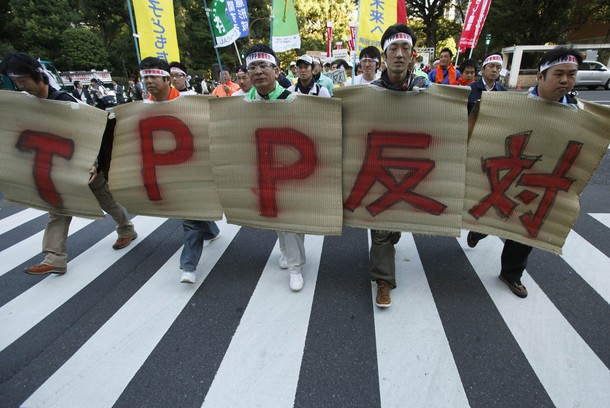In Japan, possible free trade deal comes with an argument

Washington Post, October 30, 2011
In Japan, possible free trade deal comes with an argument
By Chico Harlan
TOKYO — In an upscale neighborhood where Japanese buy their handbags and smartphones, furious farmers drove their tractors down the main road last week in their latest protest against a controversial regionwide free-trade pact.
The stunt was an illustration of the way the country’s agricultural forces are pushing up against modern glitz. As Japan nears a self-imposed deadline to decide whether to participate in the U.S.-backed Trans-Pacific Partnership, it must first resolve a clash between farmers who think the pact will ruin them and exporters who want to reach new markets with lower tariffs.
Nine other countries, including the United States, have committed to the agreement, which would eliminate tariffs and trade barriers within 10 years. In Japan, though, the prospect of across-the-board trade liberalization has raised fundamental questions about the nation’s shrinking economy — and which of its sectors, business or agriculture, need the most help.
Business leaders say the TPP is a necessary counter to the surging yen, which has made Japanese products more expensive overseas and forced some companies torelocate to China or Southeast Asia. (Japan lowered the value of the yen overnight with a massive sell-off.)
The trade pact also would give Japan new international weight, strengthening its ties with the United States at a time when South Korea has just signed a new free-trade deal with Washington. Japan’s new prime minister, Yoshihiko Noda, hopes to tell President Obama at the Nov. 12-13 Asia-Pacific summit in Hawaii that Japan will join the deal.
But Japan rarely makes a major move without consensus, and for that reason, Japan’s farmers — who account for 1 percent of the GDP — pose an inordinate problem. Because of the country’s electoral system, rural areas hold disproportionate power and the farm lobby is among the most powerful.
The lobby group said last week that 350 of Japan’s 722 parliamentarians oppose the trade deal.
For years, Japan has protected its farmers from cheaper imports by imposing high tariffs, including a tariff of nearly 800 percent on rice. Once those tariffs crumble, Japan’s farmers will struggle to compete.
The average age of a farmer in Japan is 65. Most work part time, on tiny parcels of land. Some farmers know that reform is necessary — they are withering, trade deal or not — but they’d prefer to make changes more gradually. The TPP, the farm lobby says, would put 3.4 million farmers out of business, many of them in the northern coastal region that is still recovering from the March 11 earthquake and tsunami.
“This is a very politically sensitive issue,” an official in the prime minister’s office said, speaking on the condition of anonymity to describe government deliberations. “And there is sizable opposition, even within the [ruling] party. It is not wise to say we have made up our mind” on whether to join the trade deal, the official said.
The TPP began five years ago as a tiny agreement between Singapore, Brunei, Chile and New Zealand. It has widened into an Asia-Pacific deal that includes agricultural heavyweights Australia and the United States. Japan has been debating for more than a year over whether to join the pact. But Tokyo’s leadership remains divided.
Masahiko Yamada, a former farm minister and a member of the ruling Democratic Party of Japan, said last week that if Japan jumped too quickly to a decision, some members might leave the already-fractious party. “If Noda does not make a wise decision on this, he may end up losing power,” Yamada said at a news conference.
Noda said Friday that “serious discussion” was still necessary and that Japan “will reach a conclusion at the earliest stage possible.”
In a recent editorial, the Yomiuri Shimbun, Japan’s largest daily newspaper, offered the prime minister some suggestions, providing an outline for an agricultural overhaul. Farmland should be consolidated, allowing for larger-scale operations, the paper said. Meanwhile, if Japan joins the TPP and tariffs drop, consumers will pay less for food. New taxes, then, could be funneled to farmers whose profits decline.
“Noda should exercise leadership by announcing a reform plan to realize a strong Japanese agricultural sector that will be able to stand waves of trade liberalization,” the editorial said. “At the same time, he should hurry up in deciding to join the TPP negotiations.”





